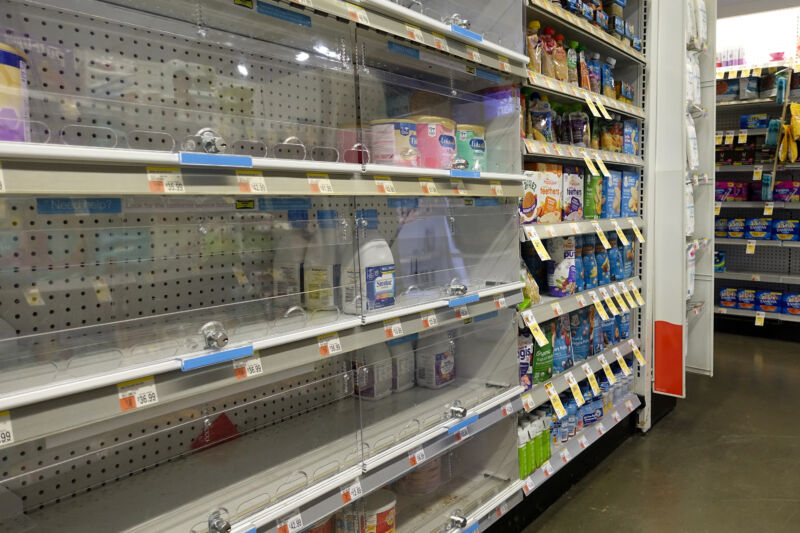
The shortage of infant formulas and formulas continues to grow in the US, with the national percentage of product sold out reaching a high of 43 percent in the first week of May, according to data released this week by Datasembly, which tracks retail information.
With bare in-store shelves, purchase limits and online pricing and scams, parents across the country are struggling to feed bottle-fed babies and children with medical conditions that require specialized formulas. News stories are full of parents driving hours to search stores for formulas or to post pleas online. Some even water down the formula or turn to recalled batches contaminated with dangerous bacteria.
The dire shortage is due to a combination of factors, including pandemic issues in the supply chain, product recalls and inflation, said Ben Reich, CEO of Datasemly.
While the national out-of-stock rate was relatively stable in the first half of 2021, remaining between 2 percent and 8 percent, supply issues began to steadily worsen in July and have peaked since February, according to Datasembly.
In February, the situation escalated when the US Food and Drug Administration warned that the formula made by Abbott Nutrition’s Sturgis, Michigan plant could be contaminated with Cronobacter sakazakii or salmonella Newport bacteria. Following the warning, Abbott issued a recall of powder formulas under the Similac, Alimentum and EleCare labels manufactured at the Sturgis facility.
Four babies – one in Minnesota, two in Ohio and one in Texas – got sick with… Cronobacter infections after consuming the formula that came out of the facility. The two babies in Ohio died. The FDA and Centers for Disease Control and Prevention say the infections “may have contributed to the death of” [the] two babies.”
In the wake of the recall, the percentage of sold-out formulas reached 30 percent in early April and then rose to 40 percent by the end of the month. The increase continues into May.
Stimulate supply
In a statement released Wednesday, Abbott said his review “found no evidence to link our formulas to these teething problems.” The company said it had found Cronobacter at its Sturgis facility, but positive samples came from “non-product contact areas of the facility.” Nevertheless, the FDA provided Abbott with a list of problems it found in the facility, which is currently closed. Abbott said it is now working to address these, including updating cleaning and maintenance procedures and retraining employees.
“We know that the recall has exacerbated a pre-existing infant formula shortage in the US and we have seen and heard the stress and despair of parents faced with empty shelves,” Abbott said in his statement. “We deeply regret the situation and since the recall, we have been working to increase supply in our other FDA registered facilities, including bringing Similac from our Cootehill, Ireland location by air and producing more liquid Similac and Alimentum also began releasing metabolic formulas that were on hold earlier this month at the request of the FDA to those in need of these unique formulas.”
Abbott reported that getting the Sturgis facility back up and running requires FDA approval, but the company hopes it can be done within the next two weeks. After the restart, it will take six to eight weeks before the new formula is in the shops.
In a release Tuesday, FDA Commissioner Robert Califf said the agency is doing everything it can to get more formula on shelves.
We recognize that many consumers do not have access to infant formula and essential medical foods that they are accustomed to using and are frustrated by their inability to do so. We do everything we can to ensure that there is enough product available where and when they need it. It is of utmost importance to the FDA to ensure that safe, exclusive nutritional products such as infant formula are available. Our teams have worked tirelessly to address and alleviate delivery issues and will continue to do everything within our power to ensure the production of safe infant formula products.
The FDA said it was taking several steps to boost production, including speeding up regulatory assessments for formula makers and speeding up certifications for formula imports. The agency also has no objection to releasing formulas on a case-by-case basis at the Sturgis facility by Abbott to parents in need of urgent, life-sustaining supplies for specialty and metabolic formulas.

